人教新目标(Go for it)版八年级下册Unit 3 Could you please clean your room? SectionA知识点课件(共31张PPT)
文档属性
| 名称 | 人教新目标(Go for it)版八年级下册Unit 3 Could you please clean your room? SectionA知识点课件(共31张PPT) | 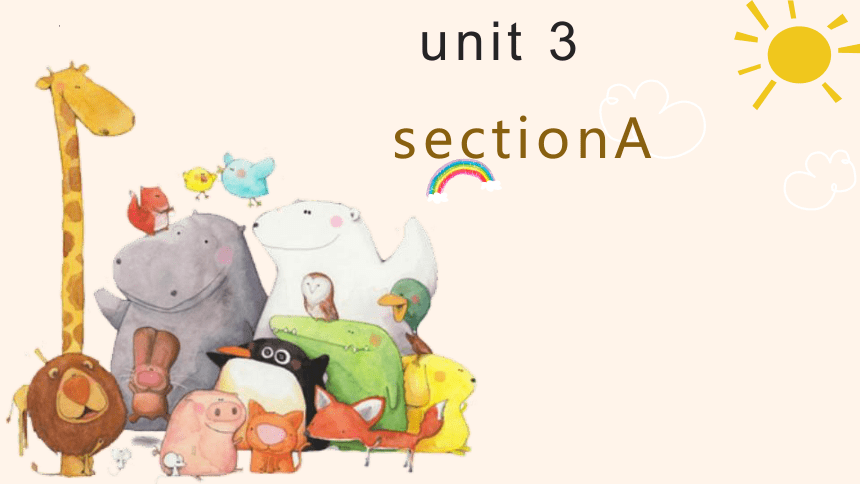 | |
| 格式 | pptx | ||
| 文件大小 | 2.8MB | ||
| 资源类型 | 教案 | ||
| 版本资源 | 人教新目标(Go for it)版 | ||
| 科目 | 英语 | ||
| 更新时间 | 2023-01-12 22:33:51 | ||
图片预览

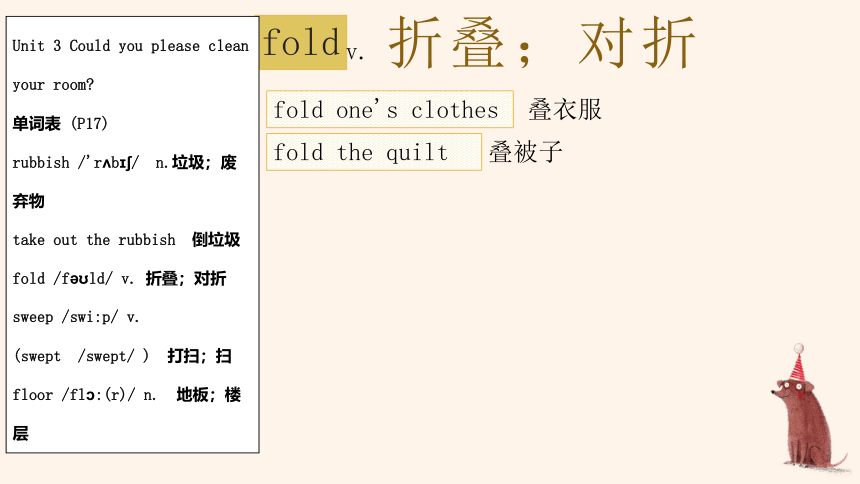
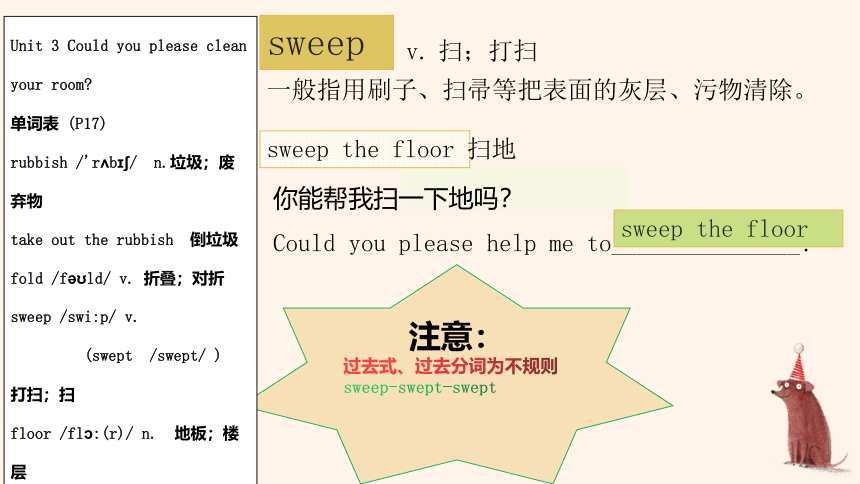
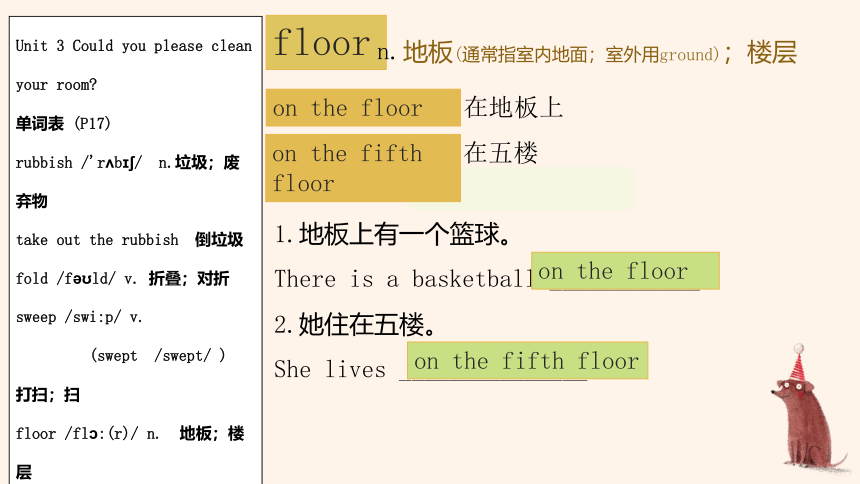
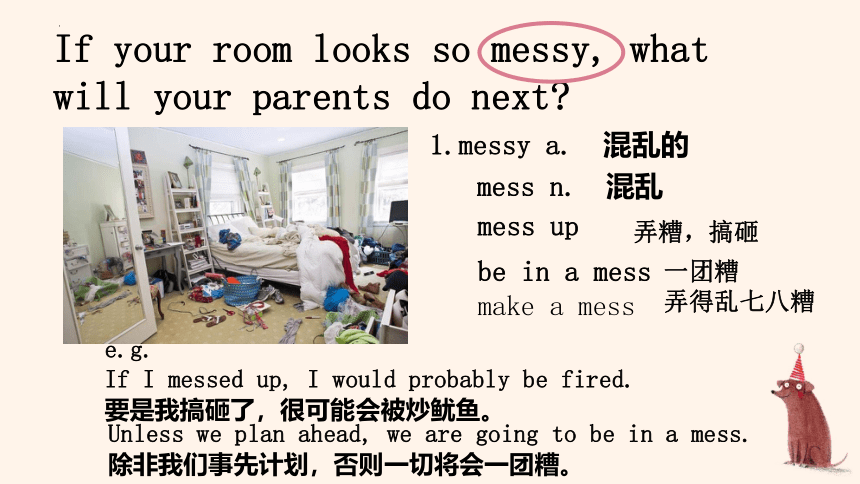
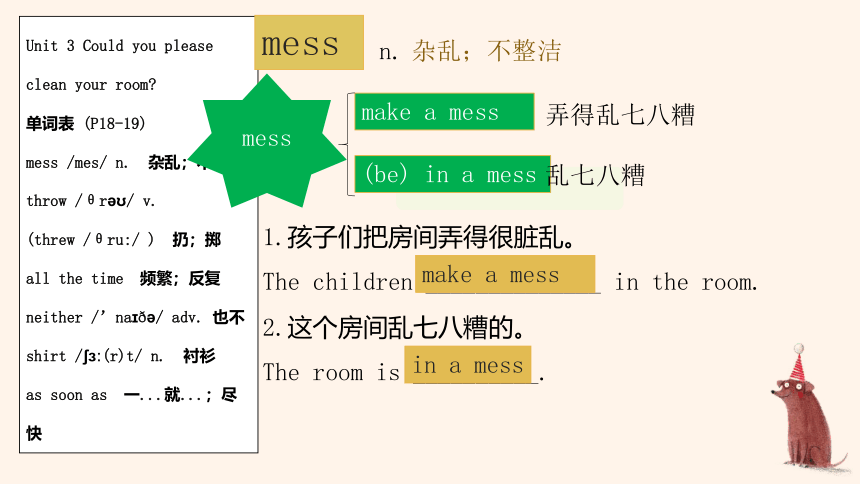
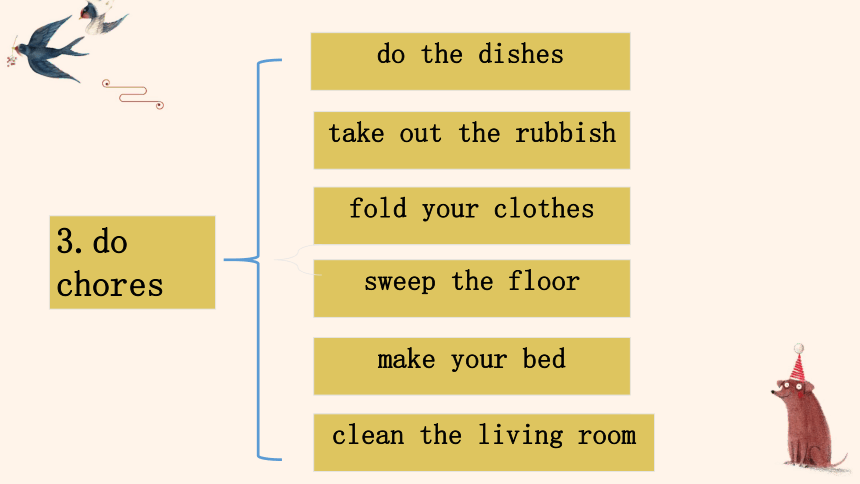
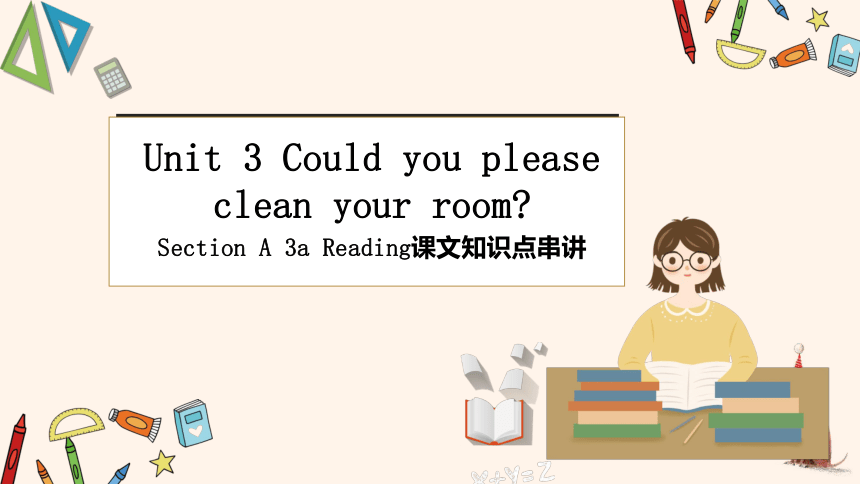
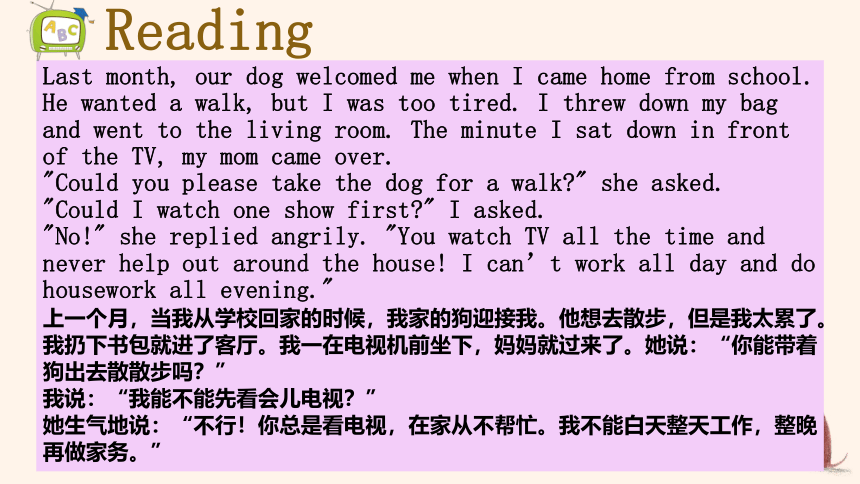
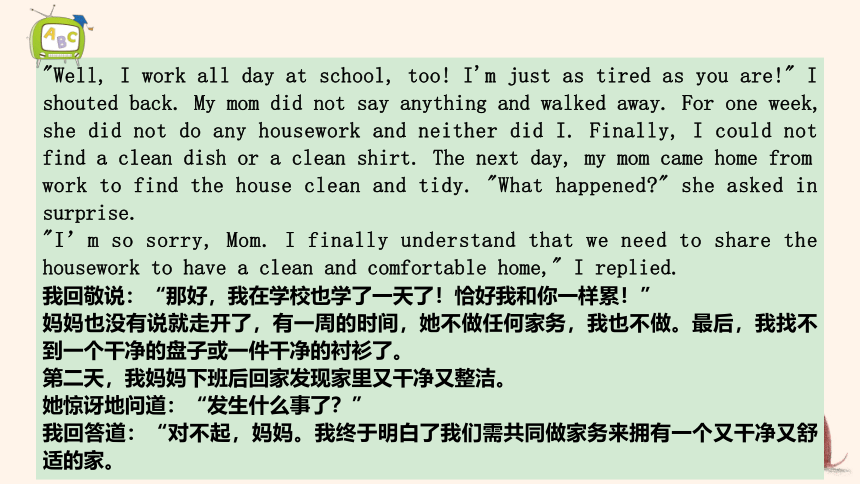
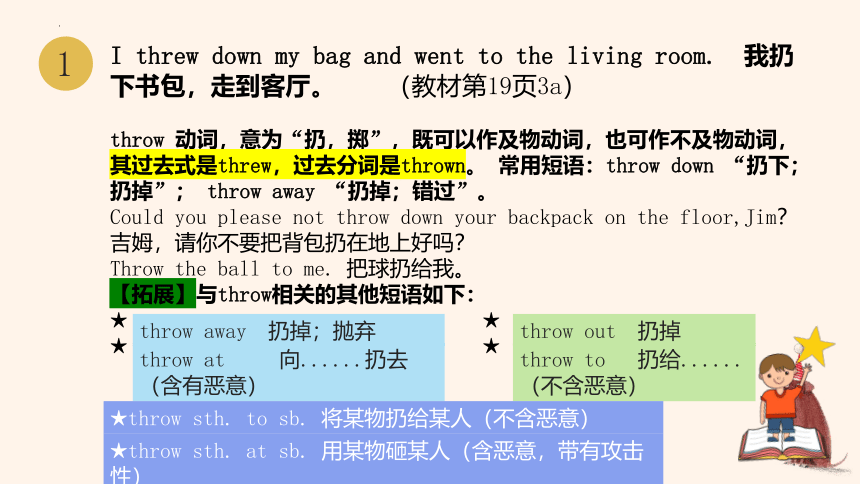
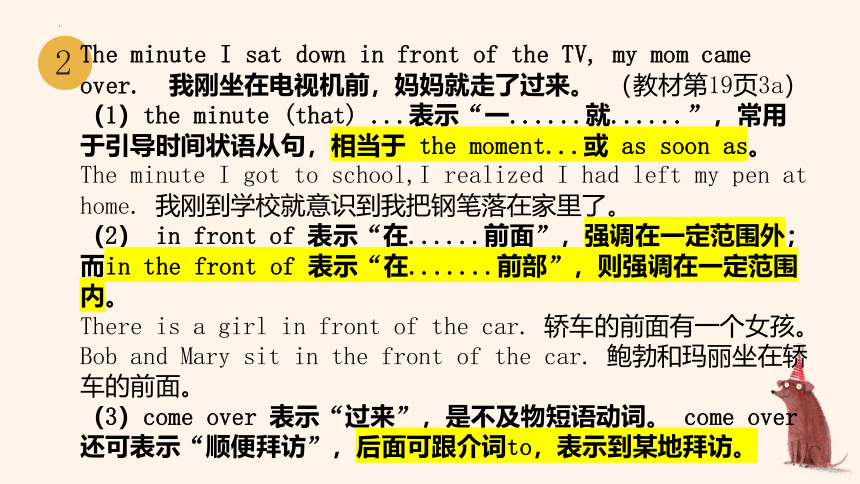
文档简介
(共31张PPT)
sectionA
unit 3
fold
v.
fold one's clothes
叠衣服
fold the quilt
叠被子
Unit 3 Could you please clean your room
单词表 (P17)
rubbish /'r b / n.垃圾;废弃物
take out the rubbish 倒垃圾
fold /f ld/ v. 折叠;对折
sweep /swi:p/ v.
(swept /swept/ ) 打扫;扫
floor /fl :(r)/ n. 地板;楼层
折叠;对折
sweep
v.
扫;打扫
sweep the floor
扫地
你能帮我扫一下地吗?
Could you please help me to_______________
sweep the floor
一般指用刷子、扫帚等把表面的灰层、污物清除。
注意:
过去式、过去分词为不规则
sweep-swept-swept
Unit 3 Could you please clean your room
单词表 (P17)
rubbish /'r b / n.垃圾;废弃物
take out the rubbish 倒垃圾
fold /f ld/ v. 折叠;对折
sweep /swi:p/ v.
(swept /swept/ ) 打扫;扫
floor /fl :(r)/ n. 地板;楼层
floor
n.
地板(通常指室内地面;室外用ground);楼层
on the floor
在地板上
1.地板上有一个篮球。
There is a basketball ____________.
2.她住在五楼。
She lives _______________.
on the fifth floor
在五楼
on the floor
on the fifth floor
Unit 3 Could you please clean your room
单词表 (P17)
rubbish /'r b / n.垃圾;废弃物
take out the rubbish 倒垃圾
fold /f ld/ v. 折叠;对折
sweep /swi:p/ v.
(swept /swept/ ) 打扫;扫
floor /fl :(r)/ n. 地板;楼层
If your room looks so messy, what will your parents do next
1.messy a. 混乱的
mess n. 混乱
be in a mess
make a mess
一团糟
弄得乱七八糟
mess up
弄糟,搞砸
e.g. If I messed up, I would probably be fired.
要是我搞砸了,很可能会被炒鱿鱼。
Unless we plan ahead, we are going to be in a mess.
除非我们事先计划,否则一切将会一团糟。
Unit 3 Could you please clean your room
单词表 (P18-19)
mess /mes/ n. 杂乱;不整洁
throw /θr / v.
(threw /θru:/ ) 扔;掷
all the time 频繁;反复
neither /’na / adv. 也不
shirt / (r)t/ n. 衬衫
as soon as 一...就...;尽快
mess
n.
杂乱;不整洁
make a mess
mess
(be) in a mess
弄得乱七八糟
乱七八糟
1.孩子们把房间弄得很脏乱。
The children ______________ in the room.
2.这个房间乱七八糟的。
The room is __________.
make a mess
in a mess
洗碗
3.do chores
do the dishes
倒垃圾
叠你的衣服
扫地
整理床铺
打扫起居室
sweep the floor
fold your clothes
make your bed
take out the rubbish
clean the living room
Unit 3 Could you please clean your room
Section A 3a Reading课文知识点串讲
Last month, our dog welcomed me when I came home from school. He wanted a walk, but I was too tired. I threw down my bag and went to the living room. The minute I sat down in front of the TV, my mom came over.
"Could you please take the dog for a walk " she asked.
"Could I watch one show first " I asked.
"No!" she replied angrily. "You watch TV all the time and never help out around the house! I can’t work all day and do housework all evening."
上一个月,当我从学校回家的时候,我家的狗迎接我。他想去散步,但是我太累了。我扔下书包就进了客厅。我一在电视机前坐下,妈妈就过来了。她说:“你能带着狗出去散散步吗?”
我说:“我能不能先看会儿电视?”
她生气地说:“不行!你总是看电视,在家从不帮忙。我不能白天整天工作,整晚再做家务。”
Reading
"Well, I work all day at school, too! I'm just as tired as you are!" I shouted back. My mom did not say anything and walked away. For one week, she did not do any housework and neither did I. Finally, I could not find a clean dish or a clean shirt. The next day, my mom came home from work to find the house clean and tidy. "What happened " she asked in surprise.
"I’m so sorry, Mom. I finally understand that we need to share the housework to have a clean and comfortable home," I replied.
我回敬说:“那好,我在学校也学了一天了!恰好我和你一样累!”
妈妈也没有说就走开了,有一周的时间,她不做任何家务,我也不做。最后,我找不到一个干净的盘子或一件干净的衬衫了。
第二天,我妈妈下班后回家发现家里又干净又整洁。
她惊讶地问道:“发生什么事了?”
我回答道:“对不起,妈妈。我终于明白了我们需共同做家务来拥有一个又干净又舒适的家。
1
I threw down my bag and went to the living room. 我扔下书包,走到客厅。 (教材第19页3a)
throw 动词,意为“扔,掷”,既可以作及物动词,也可作不及物动词,其过去式是threw,过去分词是thrown。 常用短语:throw down “扔下;扔掉”; throw away “扔掉;错过”。
Could you please not throw down your backpack on the floor,Jim?吉姆,请你不要把背包扔在地上好吗?
Throw the ball to me. 把球扔给我。
【拓展】与throw相关的其他短语如下:
★ ★
★ ★
throw away 扔掉;抛弃
throw out 扔掉
throw at 向......扔去(含有恶意)
throw to 扔给......(不含恶意)
★throw sth. to sb. 将某物扔给某人(不含恶意)
★throw sth. at sb. 用某物砸某人(含恶意,带有攻击性)
2
The minute I sat down in front of the TV, my mom came over. 我刚坐在电视机前,妈妈就走了过来。 (教材第19页3a)
(1)the minute (that) ...表示“一......就......”,常用于引导时间状语从句,相当于 the moment...或 as soon as。
The minute I got to school,I realized I had left my pen at home. 我刚到学校就意识到我把钢笔落在家里了。
(2) in front of 表示“在......前面”,强调在一定范围外;而in the front of 表示“在.......前部”,则强调在一定范围内。
There is a girl in front of the car. 轿车的前面有一个女孩。
Bob and Mary sit in the front of the car. 鲍勃和玛丽坐在轿车的前面。
(3)come over 表示“过来”,是不及物短语动词。 come over 还可表示“顺便拜访”,后面可跟介词to,表示到某地拜访。
①come across 遇见;(偶然)发现
②come out 出版;开花
③come back 回来
④ come in 进来
⑤ come up with 想出;提出
⑥come from 来自
含有come的其他常用短语如下:
3
You watch TV all the time and never help out around the house ! 你总是看电视,在家里从不帮忙! (教材第19页3a)
all the time 意为“频繁;反复”,强调某动作在某时间段内一直进行或反复发生,在句中做状语,通常位于句末。
No one can be a winner all the time.
没有人能一直是赢家。
I’m tired of doing the same thing all the time. Let’s try something new!
我厌倦了一直做相同的事情。让我们尝试一些新东西吧!
【拓展】
(1)always 也意为“总是”,常位于实义动词之前,助动词、情态动词或be动词之后。
She always gets the first place in the English exams.
她总是在英语考试中得第一名。
He can always makes me laugh when I feel sad.
我难过的时候,他总是能把我逗笑。
(2)与time相关的其他常用短语如下:
in time 及时
on time 按时
at the same time
同时
at times/from time to time 有时;偶尔
by the time ......到......时候;到......之前
for the first time
第一次
4
I’m just as tired as you are ! 我和你一样累!(教材第19页3a)
as...as... 意为“与......一样......”,用于同级比较,两个as中间用形容词或副词原级。
The tree is as tall as the building. 这棵树和那栋楼一样高。
He runs as quickly as his father. 他跑得和他父亲一样快。
【拓展】
as...as...的否定形式 not as/so...as..., 意为“不如......那样......”。
She doesn’t study so/as hard as her brother. 她不如她的哥哥学习努力。
Lesson 6 is not as/ so difficult as Lesson 7.
第六课不如第七课难。
5
For one week,she did not do any housework and neither did I. 有一个星期,她没做任何家务,我也没做。(教材第19页3a)
neither 此处用作副词,意为“也不”。neither did I 是倒装结构,相当于 me neither。 “neither+助动词/情态动词/系动词+主语”结构,表示前面叙述的否定情况也适合另外的人或物。当前面叙述的肯定情况也适用于后者时,要用“so+助动词/情态动词/系动词+主语”结构。
【拓展】
neither 的其他用法如下:
(1)neither 还可做代词,意为“(两者)都不”。其反义词为both,意为“两者都”。“neither of+复数名词/代词”结构做主语时,谓语动词用单复数形式都可以。
neither
adv.
也不
表示前面叙述的否定情况也适合另外的人或物
否定句,neither+be/助动词/情态动词+主语
肯定句,so+be/助动词/情态动词+主语
表示前面叙述的肯定情况也适合另外的人或物
1.我不喜欢篮球,她也不喜欢。
I don't like basketball, ________________.
2.Helen不会说英语,我也不会。
Helen can't speak English,______________.
neither does she
neither can I
Unit 3 Could you please clean your room
单词表 (P18-19)
mess /mes/ n. 杂乱;不整洁
throw /θr / v.
(threw /θru:/ ) 扔;掷
all the time 频繁;反复
neither /’na / adv. 也不
shirt / (r)t/ n. 衬衫
as soon as 一...就...;尽快
neither
7
“What happened ” she asked in surprise. “发生什么事了?” 她吃惊地问道。 (教材第19页3a)
in surprise 意为“惊讶地;吃惊地”,在句中做状语,表示状态。 此处surprise作名词,意为”惊奇;惊讶“,其常用短语还有 to one’s surprise,意为”使......惊讶的是;出乎......的意料“。
She looked up in surprise. 她惊讶地抬起头。
【拓展】
surprise 作动词,意为“使惊讶”。
常见的相关词如下:
surprised adj. 惊奇的;惊讶的
surprising adj. 令人吃惊的
修饰人
修饰物
as soon as
一…就…;尽快
Unit 3 Could you please clean your room
单词表 (P18-19)
mess /mes/ n. 杂乱;不整洁
throw /θr / v.
threw /θru:/ ) 扔;掷
all the time 频繁;反复
neither /’na / adv. 也不
shirt / (r)t/ n. 衬衫
as soon as 一...就...;尽快
引导时间状语从句,强调两个动作在时间上是接连发生的.
主将从现
1.他一坐下就拿出英语书来.
He took out his English book ___________ he sat down.
2.我一到达北京就会给你打电话.
I will call you as soon as I _______ Beijing.
as soon as
get to
Unit 3 Could you please clean your room
单词表 (P20)
pass /pɑ s/ v. 给;递;走过;通过
borrow /’b r / v. 借;借用
lend /lend/ v.(lent /lent/ ) 借给;借出
finger /’f g (r)/ n. 手指
hate /he t/ v. 厌恶;讨厌
chore /t :(r)/ n.
杂务;乏味无聊的工作
while /wa l/ conj.
与...同时;当...的时候
pass
给;递;走过;通过
v.
pass sb sth
pass
后接双宾语
pass sth to sb
把某物(传)递给某人
1.请把书递给我.
Please _________________.
=Please ___________________.
2.我昨天经过了那家商店.
I ________ the shop yesterday.
3.我们都通过了考试.
We all ________________.
pass me the book
pass the book to me
当直接宾语为代词时,只能用pass sth to sb.
passed
passed the exam
Unit 3 Could you please clean your room
单词表 (P20)
pass /pɑ s/ v. 给;递;走过;通过
borrow /’b r / v. 借;借用
lend /lend/ v.(lent /lent/ ) 借给;借出
finger /’f g (r)/ n. 手指
hate /he t/ v. 厌恶;讨厌
chore /t :(r)/ n.
杂务;乏味无聊的工作
while /wa l/ conj.
与...同时;当...的时候
borrow
借;借用
vt.
表示主语借用别人的东西.常用结构:
borrow sth from sb/somewhere
1.Bob向他的朋友借了一本书.
Bob _________ a book _______ his friend.
2.他从图书馆借了一些书.
He __________ some books ______ the library.
borrowed
from
borrowed
from
向某人/从某地借某物
Unit 3 Could you please clean your room
单词表 (P20)
pass /pɑ s/ v. 给;递;走过;通过
borrow /’b r / v. 借;借用
lend /lend/ v.(lent /lent/ ) 借给;借出
finger /’f g (r)/ n. 手指
hate /he t/ v. 厌恶;讨厌
chore /t :(r)/ n.
杂务;乏味无聊的工作
while /wa l/ conj.
与...同时;当...的时候
lend
借给;借出(lend-lent-lent)
vt.
表示主语把自己的东西借给他人.(反义词为borrow).常用结构:
lend sb sth=lend sth to sb
借给某人某物
你可以借给我一些书吗
Can you ______ me some books
=Can you _____ some books ___ me
lend
to
lend
辨析:lend, borrow 和keep
lend
borrow
keep
借给;借出
借进;借入
保存
非延续性动词
非延续性动词
延续性动词
强调主语把自己的东西借出去.
强调主语从别人那里把东西借来.
可与一段时间连用
1.昨天我借给了Helen一只钢笔.
I _______ a pen _______ Helen yesterday.
2.昨天Helen从我这儿借了一只钢笔.
Helen ___________ a pen _______ me yesterday.
3.这支钢笔Helen可以借用一个星期.
Helen can ________ the pen for a week.
lent
to
borrowed
from
keep
Unit 3 Could you please clean your room
单词表 (P20)
pass /pɑ s/ v. 给;递;走过;通过
borrow /’b r / v. 借;借用
lend /lend/ v.(lent /lent/ ) 借给;借出
finger /’f g (r)/ n. 手指
hate /he t/ v. 厌恶;讨厌
chore /t :(r)/ n.
杂务;乏味无聊的工作
while /wa l/ conj.
与...同时;当...的时候
finger
手指
n.
我昨天割破了手指.
I cut my finger yesterday.
Unit 3 Could you please clean your room
单词表 (P20)
pass /pɑ s/ v. 给;递;走过;通过
borrow /’b r / v. 借;借用
lend /lend/ v.(lent /lent/ ) 借给;借出
finger /’f g (r)/ n. 手指
hate /he t/ v. 厌恶;讨厌
chore /t :(r)/ n.
杂务;乏味无聊的工作
while /wa l/ conj.
与...同时;当...的时候
hate
讨厌;厌恶
v.
表示一种感情或心理状态,不能用于进行时,反义词为like/love.
讨厌某物/某人
hate sth/sb
hate
hate to do/doing sth
厌恶做某事
我喜欢做饭但讨厌洗餐具.
I like cooking but hate doing the dishes.
Unit 3 Could you please clean your room
单词表 (P20)
pass /pɑ s/ v. 给;递;走过;通过
borrow /’b r / v. 借;借用
lend /lend/ v.(lent /lent/ ) 借给;借出
finger /’f g (r)/ n. 手指
hate /he t/ v. 厌恶;讨厌
chore /t :(r)/ n.
杂务;乏味无聊的工作
while /wa l/ conj.
与...同时;当...的时候
chore
杂物;乏味无聊的工作
n.
我讨厌做家务.
I hate doing chores.
Unit 3 Could you please clean your room
单词表 (P20)
pass /pɑ s/ v. 给;递;走过;通过
borrow /’b r / v. 借;借用
lend /lend/ v.(lent /lent/ ) 借给;借出
finger /’f g (r)/ n. 手指
hate /he t/ v. 厌恶;讨厌
chore /t :(r)/ n.
杂务;乏味无聊的工作
while /wa l/ conj.
与...同时;当...的时候
while
与…同时;当…的时候
conj.
当他们在说话时,老师进来了.
While they were talking, the teacher came in.
辨析:while和when
while
when
从句谓语动词必须是延续性动词
从句谓语动词可为延续性动词,也可为非延续性动词
从句通常为进行时,如果主句和从句中的动作是同时进行的,那么主句也要用进行时.
从句的时态多为一般现在时或一般过去时.
1.妈妈在做饭时我在做作业.
I was doing my homework ______ my mom was cooking.
2.我进来时,爸爸在看报纸.
My father was reading a newspaper ______ I came in.
while
when
1.北方天气寒冷,而南方温暖.
It’s cold in the north _______ it’s warm in the south.
2.我喜欢蓝色而我姐姐喜欢红色.
I like blue ______ my sister likes red.
拓展:
while还可意为“而;然而”,
表示两种情况的对比.
while
while
Thank you~
sectionA
unit 3
fold
v.
fold one's clothes
叠衣服
fold the quilt
叠被子
Unit 3 Could you please clean your room
单词表 (P17)
rubbish /'r b / n.垃圾;废弃物
take out the rubbish 倒垃圾
fold /f ld/ v. 折叠;对折
sweep /swi:p/ v.
(swept /swept/ ) 打扫;扫
floor /fl :(r)/ n. 地板;楼层
折叠;对折
sweep
v.
扫;打扫
sweep the floor
扫地
你能帮我扫一下地吗?
Could you please help me to_______________
sweep the floor
一般指用刷子、扫帚等把表面的灰层、污物清除。
注意:
过去式、过去分词为不规则
sweep-swept-swept
Unit 3 Could you please clean your room
单词表 (P17)
rubbish /'r b / n.垃圾;废弃物
take out the rubbish 倒垃圾
fold /f ld/ v. 折叠;对折
sweep /swi:p/ v.
(swept /swept/ ) 打扫;扫
floor /fl :(r)/ n. 地板;楼层
floor
n.
地板(通常指室内地面;室外用ground);楼层
on the floor
在地板上
1.地板上有一个篮球。
There is a basketball ____________.
2.她住在五楼。
She lives _______________.
on the fifth floor
在五楼
on the floor
on the fifth floor
Unit 3 Could you please clean your room
单词表 (P17)
rubbish /'r b / n.垃圾;废弃物
take out the rubbish 倒垃圾
fold /f ld/ v. 折叠;对折
sweep /swi:p/ v.
(swept /swept/ ) 打扫;扫
floor /fl :(r)/ n. 地板;楼层
If your room looks so messy, what will your parents do next
1.messy a. 混乱的
mess n. 混乱
be in a mess
make a mess
一团糟
弄得乱七八糟
mess up
弄糟,搞砸
e.g. If I messed up, I would probably be fired.
要是我搞砸了,很可能会被炒鱿鱼。
Unless we plan ahead, we are going to be in a mess.
除非我们事先计划,否则一切将会一团糟。
Unit 3 Could you please clean your room
单词表 (P18-19)
mess /mes/ n. 杂乱;不整洁
throw /θr / v.
(threw /θru:/ ) 扔;掷
all the time 频繁;反复
neither /’na / adv. 也不
shirt / (r)t/ n. 衬衫
as soon as 一...就...;尽快
mess
n.
杂乱;不整洁
make a mess
mess
(be) in a mess
弄得乱七八糟
乱七八糟
1.孩子们把房间弄得很脏乱。
The children ______________ in the room.
2.这个房间乱七八糟的。
The room is __________.
make a mess
in a mess
洗碗
3.do chores
do the dishes
倒垃圾
叠你的衣服
扫地
整理床铺
打扫起居室
sweep the floor
fold your clothes
make your bed
take out the rubbish
clean the living room
Unit 3 Could you please clean your room
Section A 3a Reading课文知识点串讲
Last month, our dog welcomed me when I came home from school. He wanted a walk, but I was too tired. I threw down my bag and went to the living room. The minute I sat down in front of the TV, my mom came over.
"Could you please take the dog for a walk " she asked.
"Could I watch one show first " I asked.
"No!" she replied angrily. "You watch TV all the time and never help out around the house! I can’t work all day and do housework all evening."
上一个月,当我从学校回家的时候,我家的狗迎接我。他想去散步,但是我太累了。我扔下书包就进了客厅。我一在电视机前坐下,妈妈就过来了。她说:“你能带着狗出去散散步吗?”
我说:“我能不能先看会儿电视?”
她生气地说:“不行!你总是看电视,在家从不帮忙。我不能白天整天工作,整晚再做家务。”
Reading
"Well, I work all day at school, too! I'm just as tired as you are!" I shouted back. My mom did not say anything and walked away. For one week, she did not do any housework and neither did I. Finally, I could not find a clean dish or a clean shirt. The next day, my mom came home from work to find the house clean and tidy. "What happened " she asked in surprise.
"I’m so sorry, Mom. I finally understand that we need to share the housework to have a clean and comfortable home," I replied.
我回敬说:“那好,我在学校也学了一天了!恰好我和你一样累!”
妈妈也没有说就走开了,有一周的时间,她不做任何家务,我也不做。最后,我找不到一个干净的盘子或一件干净的衬衫了。
第二天,我妈妈下班后回家发现家里又干净又整洁。
她惊讶地问道:“发生什么事了?”
我回答道:“对不起,妈妈。我终于明白了我们需共同做家务来拥有一个又干净又舒适的家。
1
I threw down my bag and went to the living room. 我扔下书包,走到客厅。 (教材第19页3a)
throw 动词,意为“扔,掷”,既可以作及物动词,也可作不及物动词,其过去式是threw,过去分词是thrown。 常用短语:throw down “扔下;扔掉”; throw away “扔掉;错过”。
Could you please not throw down your backpack on the floor,Jim?吉姆,请你不要把背包扔在地上好吗?
Throw the ball to me. 把球扔给我。
【拓展】与throw相关的其他短语如下:
★ ★
★ ★
throw away 扔掉;抛弃
throw out 扔掉
throw at 向......扔去(含有恶意)
throw to 扔给......(不含恶意)
★throw sth. to sb. 将某物扔给某人(不含恶意)
★throw sth. at sb. 用某物砸某人(含恶意,带有攻击性)
2
The minute I sat down in front of the TV, my mom came over. 我刚坐在电视机前,妈妈就走了过来。 (教材第19页3a)
(1)the minute (that) ...表示“一......就......”,常用于引导时间状语从句,相当于 the moment...或 as soon as。
The minute I got to school,I realized I had left my pen at home. 我刚到学校就意识到我把钢笔落在家里了。
(2) in front of 表示“在......前面”,强调在一定范围外;而in the front of 表示“在.......前部”,则强调在一定范围内。
There is a girl in front of the car. 轿车的前面有一个女孩。
Bob and Mary sit in the front of the car. 鲍勃和玛丽坐在轿车的前面。
(3)come over 表示“过来”,是不及物短语动词。 come over 还可表示“顺便拜访”,后面可跟介词to,表示到某地拜访。
①come across 遇见;(偶然)发现
②come out 出版;开花
③come back 回来
④ come in 进来
⑤ come up with 想出;提出
⑥come from 来自
含有come的其他常用短语如下:
3
You watch TV all the time and never help out around the house ! 你总是看电视,在家里从不帮忙! (教材第19页3a)
all the time 意为“频繁;反复”,强调某动作在某时间段内一直进行或反复发生,在句中做状语,通常位于句末。
No one can be a winner all the time.
没有人能一直是赢家。
I’m tired of doing the same thing all the time. Let’s try something new!
我厌倦了一直做相同的事情。让我们尝试一些新东西吧!
【拓展】
(1)always 也意为“总是”,常位于实义动词之前,助动词、情态动词或be动词之后。
She always gets the first place in the English exams.
她总是在英语考试中得第一名。
He can always makes me laugh when I feel sad.
我难过的时候,他总是能把我逗笑。
(2)与time相关的其他常用短语如下:
in time 及时
on time 按时
at the same time
同时
at times/from time to time 有时;偶尔
by the time ......到......时候;到......之前
for the first time
第一次
4
I’m just as tired as you are ! 我和你一样累!(教材第19页3a)
as...as... 意为“与......一样......”,用于同级比较,两个as中间用形容词或副词原级。
The tree is as tall as the building. 这棵树和那栋楼一样高。
He runs as quickly as his father. 他跑得和他父亲一样快。
【拓展】
as...as...的否定形式 not as/so...as..., 意为“不如......那样......”。
She doesn’t study so/as hard as her brother. 她不如她的哥哥学习努力。
Lesson 6 is not as/ so difficult as Lesson 7.
第六课不如第七课难。
5
For one week,she did not do any housework and neither did I. 有一个星期,她没做任何家务,我也没做。(教材第19页3a)
neither 此处用作副词,意为“也不”。neither did I 是倒装结构,相当于 me neither。 “neither+助动词/情态动词/系动词+主语”结构,表示前面叙述的否定情况也适合另外的人或物。当前面叙述的肯定情况也适用于后者时,要用“so+助动词/情态动词/系动词+主语”结构。
【拓展】
neither 的其他用法如下:
(1)neither 还可做代词,意为“(两者)都不”。其反义词为both,意为“两者都”。“neither of+复数名词/代词”结构做主语时,谓语动词用单复数形式都可以。
neither
adv.
也不
表示前面叙述的否定情况也适合另外的人或物
否定句,neither+be/助动词/情态动词+主语
肯定句,so+be/助动词/情态动词+主语
表示前面叙述的肯定情况也适合另外的人或物
1.我不喜欢篮球,她也不喜欢。
I don't like basketball, ________________.
2.Helen不会说英语,我也不会。
Helen can't speak English,______________.
neither does she
neither can I
Unit 3 Could you please clean your room
单词表 (P18-19)
mess /mes/ n. 杂乱;不整洁
throw /θr / v.
(threw /θru:/ ) 扔;掷
all the time 频繁;反复
neither /’na / adv. 也不
shirt / (r)t/ n. 衬衫
as soon as 一...就...;尽快
neither
7
“What happened ” she asked in surprise. “发生什么事了?” 她吃惊地问道。 (教材第19页3a)
in surprise 意为“惊讶地;吃惊地”,在句中做状语,表示状态。 此处surprise作名词,意为”惊奇;惊讶“,其常用短语还有 to one’s surprise,意为”使......惊讶的是;出乎......的意料“。
She looked up in surprise. 她惊讶地抬起头。
【拓展】
surprise 作动词,意为“使惊讶”。
常见的相关词如下:
surprised adj. 惊奇的;惊讶的
surprising adj. 令人吃惊的
修饰人
修饰物
as soon as
一…就…;尽快
Unit 3 Could you please clean your room
单词表 (P18-19)
mess /mes/ n. 杂乱;不整洁
throw /θr / v.
threw /θru:/ ) 扔;掷
all the time 频繁;反复
neither /’na / adv. 也不
shirt / (r)t/ n. 衬衫
as soon as 一...就...;尽快
引导时间状语从句,强调两个动作在时间上是接连发生的.
主将从现
1.他一坐下就拿出英语书来.
He took out his English book ___________ he sat down.
2.我一到达北京就会给你打电话.
I will call you as soon as I _______ Beijing.
as soon as
get to
Unit 3 Could you please clean your room
单词表 (P20)
pass /pɑ s/ v. 给;递;走过;通过
borrow /’b r / v. 借;借用
lend /lend/ v.(lent /lent/ ) 借给;借出
finger /’f g (r)/ n. 手指
hate /he t/ v. 厌恶;讨厌
chore /t :(r)/ n.
杂务;乏味无聊的工作
while /wa l/ conj.
与...同时;当...的时候
pass
给;递;走过;通过
v.
pass sb sth
pass
后接双宾语
pass sth to sb
把某物(传)递给某人
1.请把书递给我.
Please _________________.
=Please ___________________.
2.我昨天经过了那家商店.
I ________ the shop yesterday.
3.我们都通过了考试.
We all ________________.
pass me the book
pass the book to me
当直接宾语为代词时,只能用pass sth to sb.
passed
passed the exam
Unit 3 Could you please clean your room
单词表 (P20)
pass /pɑ s/ v. 给;递;走过;通过
borrow /’b r / v. 借;借用
lend /lend/ v.(lent /lent/ ) 借给;借出
finger /’f g (r)/ n. 手指
hate /he t/ v. 厌恶;讨厌
chore /t :(r)/ n.
杂务;乏味无聊的工作
while /wa l/ conj.
与...同时;当...的时候
borrow
借;借用
vt.
表示主语借用别人的东西.常用结构:
borrow sth from sb/somewhere
1.Bob向他的朋友借了一本书.
Bob _________ a book _______ his friend.
2.他从图书馆借了一些书.
He __________ some books ______ the library.
borrowed
from
borrowed
from
向某人/从某地借某物
Unit 3 Could you please clean your room
单词表 (P20)
pass /pɑ s/ v. 给;递;走过;通过
borrow /’b r / v. 借;借用
lend /lend/ v.(lent /lent/ ) 借给;借出
finger /’f g (r)/ n. 手指
hate /he t/ v. 厌恶;讨厌
chore /t :(r)/ n.
杂务;乏味无聊的工作
while /wa l/ conj.
与...同时;当...的时候
lend
借给;借出(lend-lent-lent)
vt.
表示主语把自己的东西借给他人.(反义词为borrow).常用结构:
lend sb sth=lend sth to sb
借给某人某物
你可以借给我一些书吗
Can you ______ me some books
=Can you _____ some books ___ me
lend
to
lend
辨析:lend, borrow 和keep
lend
borrow
keep
借给;借出
借进;借入
保存
非延续性动词
非延续性动词
延续性动词
强调主语把自己的东西借出去.
强调主语从别人那里把东西借来.
可与一段时间连用
1.昨天我借给了Helen一只钢笔.
I _______ a pen _______ Helen yesterday.
2.昨天Helen从我这儿借了一只钢笔.
Helen ___________ a pen _______ me yesterday.
3.这支钢笔Helen可以借用一个星期.
Helen can ________ the pen for a week.
lent
to
borrowed
from
keep
Unit 3 Could you please clean your room
单词表 (P20)
pass /pɑ s/ v. 给;递;走过;通过
borrow /’b r / v. 借;借用
lend /lend/ v.(lent /lent/ ) 借给;借出
finger /’f g (r)/ n. 手指
hate /he t/ v. 厌恶;讨厌
chore /t :(r)/ n.
杂务;乏味无聊的工作
while /wa l/ conj.
与...同时;当...的时候
finger
手指
n.
我昨天割破了手指.
I cut my finger yesterday.
Unit 3 Could you please clean your room
单词表 (P20)
pass /pɑ s/ v. 给;递;走过;通过
borrow /’b r / v. 借;借用
lend /lend/ v.(lent /lent/ ) 借给;借出
finger /’f g (r)/ n. 手指
hate /he t/ v. 厌恶;讨厌
chore /t :(r)/ n.
杂务;乏味无聊的工作
while /wa l/ conj.
与...同时;当...的时候
hate
讨厌;厌恶
v.
表示一种感情或心理状态,不能用于进行时,反义词为like/love.
讨厌某物/某人
hate sth/sb
hate
hate to do/doing sth
厌恶做某事
我喜欢做饭但讨厌洗餐具.
I like cooking but hate doing the dishes.
Unit 3 Could you please clean your room
单词表 (P20)
pass /pɑ s/ v. 给;递;走过;通过
borrow /’b r / v. 借;借用
lend /lend/ v.(lent /lent/ ) 借给;借出
finger /’f g (r)/ n. 手指
hate /he t/ v. 厌恶;讨厌
chore /t :(r)/ n.
杂务;乏味无聊的工作
while /wa l/ conj.
与...同时;当...的时候
chore
杂物;乏味无聊的工作
n.
我讨厌做家务.
I hate doing chores.
Unit 3 Could you please clean your room
单词表 (P20)
pass /pɑ s/ v. 给;递;走过;通过
borrow /’b r / v. 借;借用
lend /lend/ v.(lent /lent/ ) 借给;借出
finger /’f g (r)/ n. 手指
hate /he t/ v. 厌恶;讨厌
chore /t :(r)/ n.
杂务;乏味无聊的工作
while /wa l/ conj.
与...同时;当...的时候
while
与…同时;当…的时候
conj.
当他们在说话时,老师进来了.
While they were talking, the teacher came in.
辨析:while和when
while
when
从句谓语动词必须是延续性动词
从句谓语动词可为延续性动词,也可为非延续性动词
从句通常为进行时,如果主句和从句中的动作是同时进行的,那么主句也要用进行时.
从句的时态多为一般现在时或一般过去时.
1.妈妈在做饭时我在做作业.
I was doing my homework ______ my mom was cooking.
2.我进来时,爸爸在看报纸.
My father was reading a newspaper ______ I came in.
while
when
1.北方天气寒冷,而南方温暖.
It’s cold in the north _______ it’s warm in the south.
2.我喜欢蓝色而我姐姐喜欢红色.
I like blue ______ my sister likes red.
拓展:
while还可意为“而;然而”,
表示两种情况的对比.
while
while
Thank you~
同课章节目录
- Unit 1 What's the matter?
- Section A
- Section B
- Unit 2 I'll help to clean up the city parks.
- Section A
- Section B
- Unit 3 Could you please clean your room?
- Section A
- Section B
- Unit 4 Why don't you talk to your parents?
- Section A
- Section B
- Unit 5 What were you doing when the rainstorm came
- Section A
- Section B
- Review of Units 1-5
- Unit 6 An old man tried to move the mountains.
- Section A
- Section B
- Unit 7 What's the highest mountain in the world?
- Section A
- Section B
- Unit 8 Have you read Treasure Island yet?
- Section A
- Section B
- Unit 9 Have you ever been to a museum?
- Section A
- Section B
- Unit 10 I've had this bike for three years.
- Section A
- Section B
